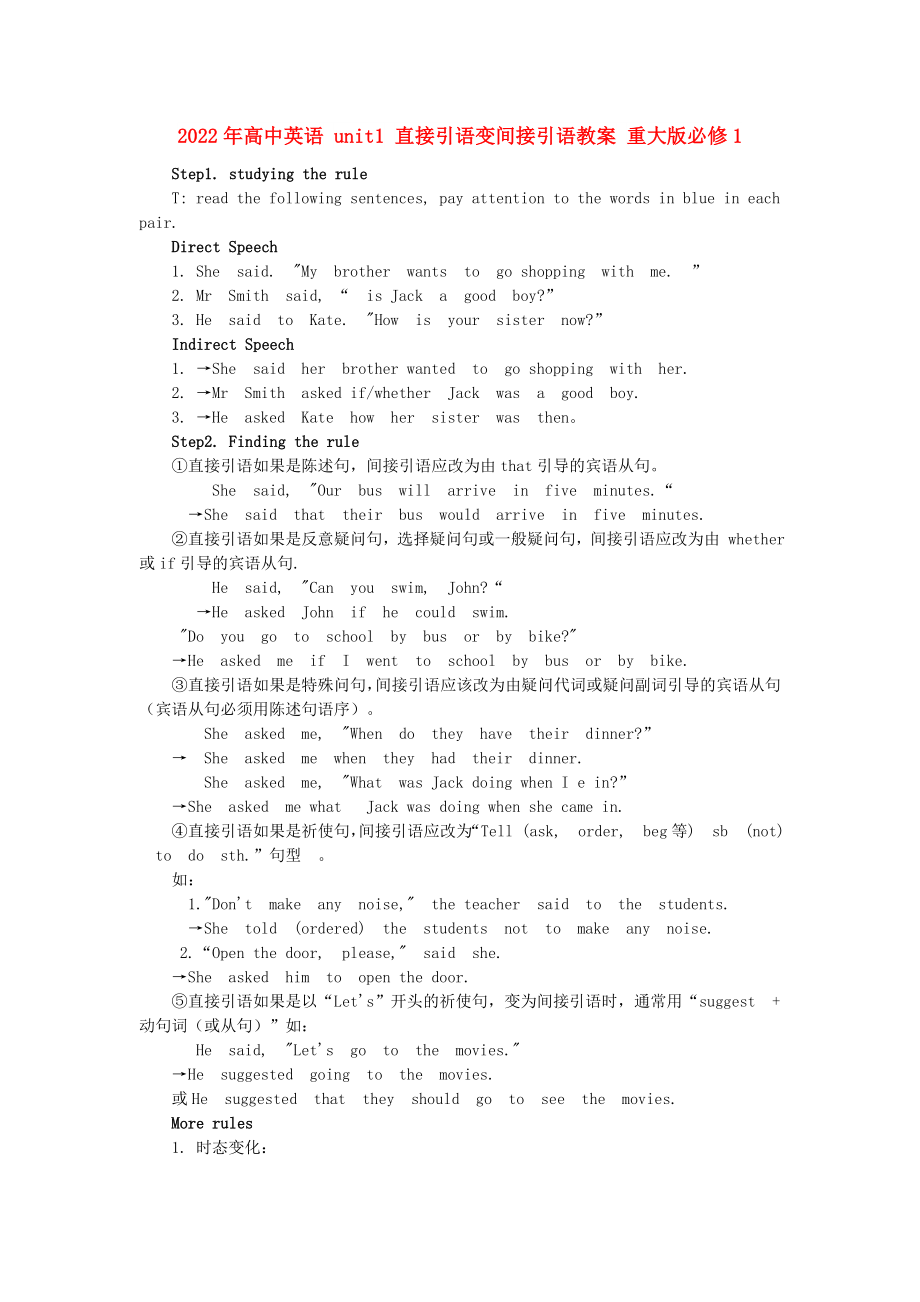《2022年高中英語(yǔ) unit1 直接引語(yǔ)變間接引語(yǔ)教案 重大版必修1》由會(huì)員分享����,可在線閱讀,更多相關(guān)《2022年高中英語(yǔ) unit1 直接引語(yǔ)變間接引語(yǔ)教案 重大版必修1(3頁(yè)珍藏版)》請(qǐng)?jiān)谘b配圖網(wǎng)上搜索�。
1、2022年高中英語(yǔ) unit1 直接引語(yǔ)變間接引語(yǔ)教案 重大版必修1
Step1. studying the rule
T: read the following sentences, pay attention to the words in blue in each pair.
Direct Speech
1. She?said.?"My?brother?wants?to?go shopping?with?me.?”
2. Mr?Smith?said, “?is Jack?a?good?boy?”
3. He?said?to?Kate.?"How?is?your?sister?
2��、now?”
Indirect Speech
1. →She?said?her?brother wanted?to?go shopping?with?her.
2. →Mr?Smith?asked if/whether?Jack?was?a?good?boy.
3. →He?asked?Kate?how?her?sister?was?then�����。
Step2. Finding the rule
①直接引語(yǔ)如果是陳述句��,間接引語(yǔ)應(yīng)改為由that引導(dǎo)的賓語(yǔ)從句�。
She?said,?"Our?bus?will?arrive?in?five?minutes.“
→She?
3、said?that?their?bus?would?arrive?in?five?minutes.
②直接引語(yǔ)如果是反意疑問(wèn)句�����,選擇疑問(wèn)句或一般疑問(wèn)句�����,間接引語(yǔ)應(yīng)改為由 whether或if引導(dǎo)的賓語(yǔ)從句.
He?said,?"Can?you?swim,?John?“
? →He?asked?John?if?he?could?swim.
"Do?you?go?to?school?by?bus?or?by?bike?"?
→He?asked?me?if?I?went?to?school?by?bus?or?by?bike.
③直接引語(yǔ)如果是特殊問(wèn)句,間接引語(yǔ)應(yīng)該改為由疑問(wèn)
4����、代詞或疑問(wèn)副詞引導(dǎo)的賓語(yǔ)從句(賓語(yǔ)從句必須用陳述句語(yǔ)序)���。
She?asked?me,?"When?do?they?have?their?dinner?”
→?She?asked?me?when?they?had?their?dinner.
She?asked?me,?"What?was Jack doing when I e in?”
→She?asked?me what? Jack was doing when she came in.
④直接引語(yǔ)如果是祈使句�����,間接引語(yǔ)應(yīng)改為“Tell (ask,?order,?beg等)?sb?(not)?to?do?sth.”
5�����、句型?�����。
如:
1."Don't?make?any?noise,"?the teacher?said?to?the?students.
?→She?told?(ordered)?the?students?not?to?make?any?noise.?
2.“Open the door,?please,"?said?she.
→She?asked?him?to?open the door.
⑤直接引語(yǔ)如果是以“Let's”開(kāi)頭的祈使句���,變?yōu)殚g接引語(yǔ)時(shí),通常用“suggest?+動(dòng)句詞(或從句)”如:
He?said,?"Let's?go?to?the?movies."?
6����、
→He?suggested?going?to?the?movies.
或He?suggested?that?they?should?go?to?see?the?movies.
More rules
1. 時(shí)態(tài)變化:
直接引語(yǔ)在改為間接引語(yǔ)時(shí)�,時(shí)態(tài)需要做相應(yīng)的調(diào)整��。
1) 一般現(xiàn)在時(shí)→一般過(guò)去時(shí)態(tài)���;
She said: “ I am a student. ”
→ She said (that) she was a student.
2)一般將來(lái)時(shí)→過(guò)去將來(lái)時(shí)
She?said, "He?will?go?to?see?his?friend.”
→She?s
7��、aid?he?would?go?to?see?his?friend��。二�����、如何變時(shí)態(tài):
3) 現(xiàn)在進(jìn)行時(shí)→過(guò)去進(jìn)行時(shí)�;
She said ,“I am reading a book.”
→She said she was reading a book.
2. 注意以下幾種情況時(shí)態(tài)不變
①直接引語(yǔ)是客觀真理����。
The?teacher said "The?earth?moves?around?the?sun?.”
→?The?teacher?said?me?the?earth?moves?around?
the?sun?earth.
Tom said,
8、 “ I am going to play basketball tomorrow.”
→ Tom said he was going to play basketball tomorrow.
②直接引語(yǔ)是過(guò)去進(jìn)行時(shí)�����,時(shí)態(tài)不變����。
Jack?said.?“I was doing chores when Tom came to see me”
→Jack?said he was doing chores when Tom came to see him.
③直接引語(yǔ)中有具體的過(guò)去某年�����、某月��、某日作狀語(yǔ)�����,
變?yōu)殚g接引語(yǔ)時(shí),時(shí)態(tài)不變��。如:
Jack?said.?"I
9����、?was?born?on?April?2l,?1980."?
→Jack said?he?was?born?on?April?21,?1980.
④直接引語(yǔ)如果是一般現(xiàn)在時(shí)。表示一種反復(fù)出現(xiàn)或習(xí)慣性的動(dòng)作�����,變間接引語(yǔ)�����,時(shí)態(tài)不變。如:
He?said,?“I?get?up?at?six?every?morning����。”?
→He?said?he?gets?up?at?six?every?morning.
⑤如果直接引語(yǔ)中的情態(tài)動(dòng)詞沒(méi)有過(guò)去時(shí)的形式不再變(例:could,?should,?would,?might)
The doctor said, “You should st
10�、ay in bed for 2 days.”
→ The doctor said I should stay in bed for 2 days.”
和已經(jīng)是過(guò)去時(shí)的形式時(shí),
例: ought?to���,?had?better,?used?to
Peter?said.?"You?had?better?e?here?today."?
→Peter?said?I?had?better?go?there?that?day.
3.狀語(yǔ)變化
(1).時(shí)間狀語(yǔ)由“現(xiàn)在”改為“原來(lái)”
(例:now變?yōu)閠hen,?yesterday變?yōu)?the?day?before, today變?yōu)?th
11�����、at day)
He said, ”I want to go swimming now. ”
→ He said he wanted to go swimming then.
(2). 地點(diǎn)狀語(yǔ)(here 變 there)
The teacher said ,“ You should e here at 7:00.”
?→The teacher said I should go there at 7:00.
(3). 指示代詞由“此”改為“彼”(this?改為that)
例: He?said,?"This?books?is?mine.“
?→He?said?
12��、that?book?was?his.
Step3. Applying the rule
Change the following direct speech into indirect speech
1) She?said,?"Our?bus?will?arrive?in?five?minutes.”
2) He?said,?"Can?you?swim,?John?”
3) She?asked?me,?"When?do?they?have?their?dinner?”
4) "Don't?make?any?noise,"?the teacher?said?to?the?students”
5) He?said,?"Let's?go?to?the?movies."?
6) She?said, "He?will?go?to?see?his?friend.”
7) The?teacher said "The?earth?moves?around?the?sun?.”
8) He?said,?“I?get?up?at?six?every?morning���。”?
9) Peter?said.?"You?had?better?e?here?today."?
 2022年高中英語(yǔ) unit1 直接引語(yǔ)變間接引語(yǔ)教案 重大版必修1
2022年高中英語(yǔ) unit1 直接引語(yǔ)變間接引語(yǔ)教案 重大版必修1

